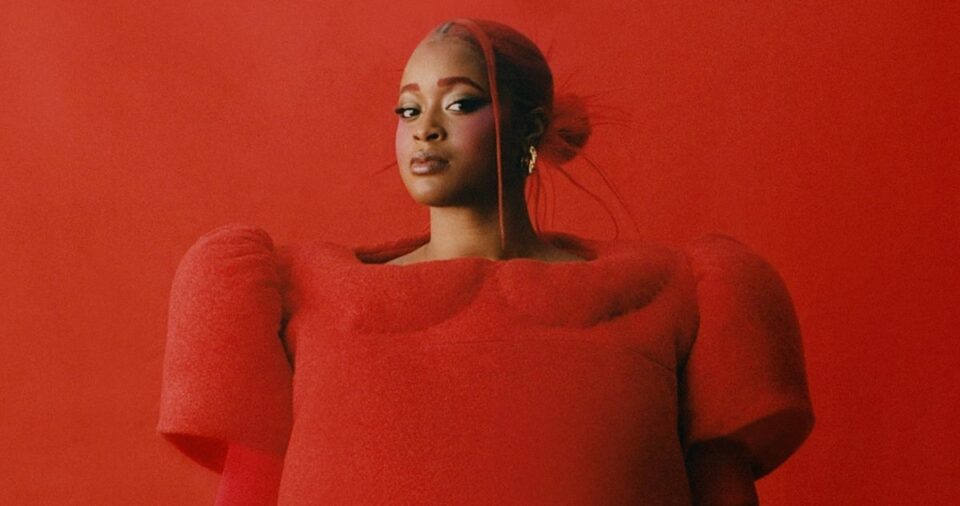In the video for her new song, “27 Club,” Tierra Whack appears in her customary setup: a surrealist world splattered with bright colors and filled with weird characters. At what seems to be a pep rally from an alternate universe, Whack wears a silver garment that looks like a cross between a choir robe and a clown suit. As a melancholy melody starts to play, she cycles through a series of animated masks — one with running eye shadow, another with subtle clown makeup — before she reveals her actual, downcast face. “I can show you how it feels,” she sings, then drops an octave, “when you lose what you love.” As band members and cheerleaders dance joyfully around her, she tells a story of disillusionment and loneliness, of how thoughts in isolation can make you feel so invisible that the people close to you can’t even recognize when you’re hurting. Those thoughts lead to an unsettling conclusion in which, on the song’s hook, Whack repeatedly chants the word suicide.
“I’m surrounded by all these people cheering me on, but it’s wearing me down,” Whack says, explaining the concept to me. “I’m trying to go through the motions because things are happening in my life but I’m still supposed to push through as a public figure.” It’s the morning after Valentine’s Day, and we’re at Yowie, a boutique hotel, shop, and café on Philadelphia’s buzzy South Street that feels straight out of one of her music videos. Owned by Whack’s friend Shannon Maldonado, it’s arrayed in bold colors and has quirky home goods for sale: Harry the Peanut candles, mini ceramic houses that store palo-santo sticks, and John Waters posters. Whack herself is dressed as if she’s about to break out into one of her dizzying rhymes, rocking a bright-green Issey Miyake pantsuit and fiery-red hair. She called the song “27 Club,” she says, “because I planned to end my life at 27. I’m 28 now, so I made it through. I’m figuring it out.”
The story of “27 Club” is a far cry from how the multifaceted Philly native first came into the public eye with her breakout 2017 single, “Mumbo Jumbo,” and then 2018’s Whack World, an audiovisual spectacle featuring 15 one-minute-long songs accompanied by stunningly inventive music videos. Generally, Whack’s work resembles off-kilter Sesame Street episodes with creepier concepts. The video for “Mumbo Jumbo” depicts a twisted trip to the dentist in which she leaves with a horrifying, permanent Joker-like smile, but the song’s contents don’t reflect any of that eeriness, mainly because there aren’t any discernible spoken words. Songs like “Hungry Hippo,” “Cable Guy,” and everything since, like “Only Child,” have been soulful, kooky Pop Art communicated through lullaby-esque melodies and buoyant raps. It never gets too dark, even when she shows flashes of sadness. But the past few years have forced Whack to confront some buried traumas, and the new music reflects that.
“I came up kinda rough. My mom was single, working many jobs. It sounds like the story is so common, but it’s my life and it’s personal to me,” she says. “Then I find this hobby: me writing poetry, then rapping. Then I realize I wanna make this my thing.” When she was 15, her mother spotted members of the We Run the Streets crew, a local rap collective, walking around the neighborhood and told Whack to spit something for them. In a moment now memorialized on YouTube, a young Whack — then going by Dizzle Dizz — raps confidently, “Stop and see, my flow is all chocolaty / I’m guaranteed a record deal / On top near Lauryn’s Hill / You wack, so imagine how Tierra feel.”
The video went viral, and We Run the Streets became her management team. Local radio stations invited her to freestyle; in one of the more popular videos from that time, she raps for Meek Mill at Philly’s Power 99 FM. Even before the otherwordly big-budget videos, you can see her penchant for humor and free expression in these early efforts: Wearing brightly colored wigs, she contorts her voice for dramatic effect and sways her body to illustrate punch lines, stylistically reminiscent of artists like M.I.A., Rye Rye, and fellow Philadelphian Santigold. “My mom used to always dress me in bright colors. I would stand out,” Whack remembers, laughing. “In school, everybody would have the navy-blue thing, and she would get me bright red and orange.” But despite the virality of that work, she didn’t love her Dizzle Dizz persona. “Everyone was happy for me, but I wasn’t happy. I just felt like I was selling myself short,” she told The Fader back in 2018. So she moved to Atlanta with her mom for her last year of high school and sharpened her skills quietly before returning to Philadelphia and going by her government name.

In 2017, with renewed confidence, Whack uploaded “Mumbo Jumbo” to SoundCloud; she signed to Interscope that same year. It changed her financial situation immediately. “I’m thinking I’m about to have to get two jobs and figure it out,” she says. “God sent me the perfect blessing.” The advance she received couldn’t have come at a better time: Some months earlier, her stepdad had thrown her out, and she was unhoused for three months, splitting time between friends’ couches and a storage unit she could barely afford. Two days before her 21st birthday, she found her grandmother unresponsive. It was the first time she had encountered a dead body.
Meanwhile, her fame was ratcheting up. Whack World dropped the following year and received rave reviews. Lauryn Hill invited her to open at a tour stop in Philadelphia, and André 3000 became a mentor. In 2019, Beyoncé enlisted Whack as a featured artist on The Lion King: The Gift album. Whack seemed primed for a career in the tradition of eccentric rap stars like Missy Elliott, Busta Rhymes, and Ludacris — more-than-capable lyricists with imaginative visual identities who offer mainstream appeal. But instead, Whack went fairly quiet. Rather than make a full-bodied follow-up to Whack World, in 2021 she released a few three-song EPs (Rap?, Pop?, and R&B?) that didn’t inspire much conversation. Late last year, she put out Cypher, a sort of autofiction documentary that captures her life as a rising rap star but takes a turn when she encounters a crazed fan. But she didn’t release an actual album.
The reason, Whack says, was that her depression had finally caught up to her and she started having suicidal thoughts. “I was at a breaking point.
I was looking for a reason to do it. But I was too cowardly to do it myself,” she says of her ideations. “As this next level of success is coming to me, I’m like, I don’t feel like I deserve this. But I worked so hard to deserve it.” (She bangs the table with every word for emphasis.) The stillness imposed by the pandemic helped. “It was like a gift and a curse because I was running,” she says. “When I finally had time to sit down, I was overwhelmed, but I knew I had to find a way out of this. The discipline of having to sit still and sit with your thoughts, I needed that.” She started seeing a therapist and doing more physical activity: playing basketball and riding her bike. Luckily, Whack World paid her bills even when she wasn’t producing more music. “Whack World is my hugest blessing because I was surviving off it for years — like, up until now,” she says. “Everything opened up: sync placements, shows, different branding deals. People were on me. It fed me for six years. That’s unheard of. That’s how I know I made a classic.”
She seems to be in a better headspace these days. Her life now consists of a routine she loves: going to her favorite smoothie spot; checking in with her mom, who lives close by; and hitting the gym to clear her mind. She’s committed to her hometown, too. “I don’t wanna be nowhere else,” she says. “A lot of my friends be tryna shit on Philly, and I tell them to shut up. They’re ready to take their next check and get out of here. I’m like, ‘What is so wrong with the city?’ ”
Despite Whack World’ssuccess, it doesn’t technically count as an album, according to the rapper’s contract with Interscope, so World Wide Whack will be her official debut. The 15-track project feels like a burial of Whack’s former self. Remnants of that other person are still there: the playfulness, the world-building, the commitment to experimentation. But there’s so much more self-reflection going on. On the album’s intro, “Mood Swing,” Whack sings beautifully about anxiety and the need to try new things, as her therapist suggested during the pandemic. In “Two Night,” she talks about dealing with feelings of abandonment by her biological father, whom she also briefly dismisses (“You remind me of my deadbeat dad”) in Whack World’s “Fuck Off.”

She collaborated with the Philadelphia-based visual artist Alex Da Corte to direct three videos for the project, including “27 Club.” They met in 2019 when Whack accompanied a mutual friend to one of Da Corte’s invite-only rehearsals for a performance. “We’re both in Philly, and we’ll send each other music or images of art and stuff,” Da Corte says. Each video represents a time of day: “Shower Song,” which incorporates techno-pop elements, features two-dimensional stop-motion graphics filled with a palette of primary colors to symbolize the morning; “27 Club” references late-’90s videos from the MTV countdown-show era; and in the soon-to-be-released video for “Two Night,” Whack plays a balloon floating through the city’s skyline before the crowd revolts, throwing stuff at her. At the end, night falls, and she’s flattened until the next day, when the cycle repeats.
The music for “27 Club” took much longer to complete than the other tracks on World Wide Whack because of the vulnerability it required. Whack says there were times when she would go to the studio, record six songs per session, and still leave unfulfilled because she couldn’t get that one song done. An unlikely source of inspiration — the 2021 documentary Bitchin’: The Sound and Fury of Rick James — set her free. “It’s one of the best documentaries I’ve ever seen,” she says. At some point in the film, the focus shifts to the Mary Jane Girls, a group the Buffalo music legend helped put together in 1979. Previously unaware of them, Whack paused the film and started to do some light research.
“That night, I got in the car and played their song ‘You Are My Heaven,’ and it did something to my body. It gave me chills. I’m like, Yo, I wanna make something like this,” she recalls. A few weeks later, at a studio session in Atlanta, her producers finally figured out the perfect way to channel that song’s energy: “We were in a dark room with a blue light. The vibe was already there. They found the right drums, then I said, ‘I can show you how it feels.’ I did not know the song would be about me attempting to kill myself, but it came so easy. I cried, and I was like, ‘This is what I’ve been trying to say.’”
Production Credits
Photographs by Camila Falquez
,
Styling by Herin Choi
,
Wardrobe: Pipenco Lorena Red Oversized Veronica Dress Joanna Laura Constantine Feminine Waves Hoops, and Wing & Weft Gloves. Marc Jacobs Oversized Striped Blazer with Trouser Pant, Louis Vuitton Broadway Loafer, and Lady Grey Jewelry rings.
,
Hair by Jamilah Curry
,
Makeup by Michela Wariebi
Related
- 42 Albums We Can’t Wait to Hear in 2024
- Tierra Whack: When I Caught the Magic of Lauryn Hill
Lawrence Burney , 2024-03-12 11:00:34
Source link


